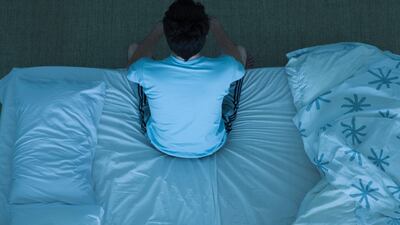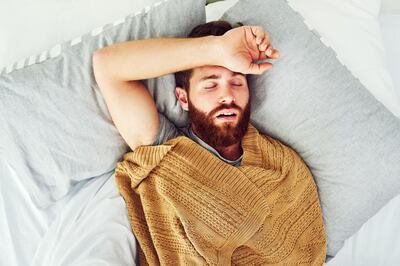Doctors in the UAE are reporting an increase in people complaining of insomnia as a result of Covid-19.
However, it is not always due to symptoms of the virus. Often, it is a result of stress.
On World Sleep Day, which falls on March 19, healthcare professionals want to highlight issues that could be causing disruptions in sleeping habits. The advice comes after a number of patients began suffering from insomnia as an indirect result of the pandemic.
Residents are increasingly stressed as a result of the pandemic, while lockdowns, curfews and gym closures have led to a lack of movement and exercise all of which can affect a person's sleep.
Lack of sleep itself can be a trigger for stress levels to soar, and to complete the vicious cycle this can then lead to losing even more sleep.
The two main sleep disorders are sleep apnea and insomnia.
Sleep apnea is a potentially serious sleep disorder where a person's breathing repeatedly stops and starts unconsciously during his or her sleep.
If you are overweight or snore loudly and feel tired even after a full night's sleep, you may have sleep apnea.
Insomnia is a more commonly heard of problem affecting one in three people in the world.
Regularly losing a few hours of sleep can lead to major disturbance in quality of life, said sleep expert and Consultant Neurologist at Sheikh Shakhbout Medical City (SSMC), Dr Mohamed Istanboli.
"We are seeing an increase in patients suffering from sleep disorders after Covid. It has created a major stress in the community and people are exercising less, which has resulted in sleep disorders in general but there are misconceptions about sleep.
"Some people believe that missing a few hours of sleep is life threatening or that if they miss a few hours of sleep then they won't be able to function."
Doctors call it 'catastrophization of sleep deficiency'.
“These people think that if they miss sleep then they will get very sick and that makes them very anxious. If they are very anxious then they are unable to sleep. So, because of the anxiety about sleep, they can’t sleep. We try to reassure them that even if you miss a few hours, you will not get sick. You will not have a heart attack, or a stroke.”
Some patients even believed a lack of sleep could cause cancer, he said.
Dr Mohamed Istanboli urged the public to be aware of how much rest they're getting each night, saying that it is important to seek help if you notice any irregularities with your sleep.
Doctors will sometimes resort to cognitive behavioural therapy to relieve stress caused by anxiety over the lack of sleep.
“On world sleep day we ask that people seek help. People think that we will give them medication to help them sleep but that is not the reality. The reality is that we give them cognitive behavioural therapy and that can help a lot. Only if that doesn’t work do we give medication.
"This is with insomnia, it is different with sleep apnea.”
Sleep apnea is on the rise because of an increase in obesity. In severe cases, patients are encouraged to lose weight and are observed overnight in a sleep lab at the hospital.
Advice from the National Sleep Foundation says the appropriate amount of sleep for toddlers is between 11 and 14 hours, pre-schoolers between ten and 13 hours, and school-aged children between nine and 11 hours.
For teenagers however eight to ten hours was considered appropriate, seven to nine hours for young adults and adults while senior people need seven to eight hours of sleep.










